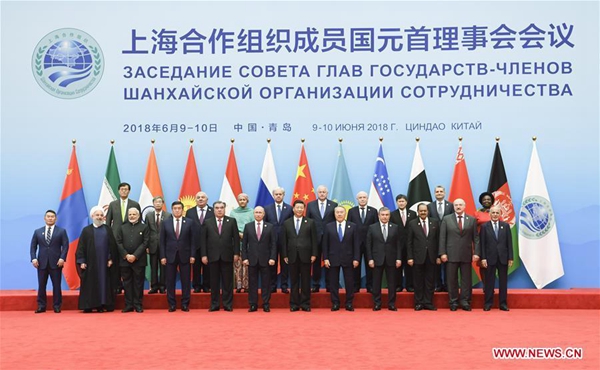SCO charts a formal course ahead against protectionism
- By Sumantra Maitra
 0 Comment(s)
0 Comment(s) Print
Print E-mail China.org.cn, June 20, 2018
E-mail China.org.cn, June 20, 2018

The Shanghai Cooperation Organization, or SCO for short, called for democracy in international relations at a historic time in world history. In complete contrast with a fractured G7, the SCO seemed to chart a path of cooperation, as the Chinese led bloc welcomed Indian and Pakistani PMs, alongside Russia and other central Asian powers.
The bloc, founded in 2001 to solve border issues, has evolved over time as a plank of regional stability and economic development. Adding more member states means more stability, as well as greater international heft. While the G7, bizarrely excludes two of the largest economies in the world, the combined economic might of China and India in SCO means it could lead in the growing battle against trade protectionism, which will transform and shift global policy in the coming years, as well as spread regional prosperity. In recent years of course, that is even more visible, with the trillion-dollar infrastructure drive across central Asia, in the form of Belt and Road initiative.
President Xi also met with PM Modi, for the second time in two months, which is of great significance and a symbol of the growing détente between two economic giants after a border row. According to Ministry of External Affairs of India, the two countries signed deals which include Basmati rice exports from India.
India needs Chinese investment, and while the details of the bilateral meetings are not available, it is in India's interest to look for alternate source of investment, as America moves towards further protectionism. The most striking difference was perhaps in the fact that this meeting went smoother, compared to the G7.
Consider this, India and China, had previously had actual border disputes, while G7 consists of allies who share a similar military alliance system. While the meeting in Asia was peaceful, the G7 ended with President Trump calling PM Trudeau weak and dishonest. It provided a perspective on a complete contrast of a crumbling Western order, despite similarities, and a rising Eastern order, despite the differences.
The statement from President Xi was predictably pro-trade and regional integration, as he pointed out the importance of globalization as an unalterable truth of the modern economy. Belt and Road cooperation was the central plank, as Xi called for cooperation in business investment, connectivity, finance and agriculture as well as advancements in trade. "While unilateralism, trade protectionism and a backlash against globalization are taking new forms, in this global village of ours where countries' interests and futures are so interconnected, the pursuit of cooperation for mutual benefit represents a surging trend," Xi was quoted by Xinhua.
While geopolitics wasn't the dominant concern, the joint statement hinted at the changing political dynamic of in the world. That "…risks associated with the aggravation of conflicts in a number of regions, terrorism, drug trafficking and organized crime, epidemics of infectious diseases and climate change are also on the rise" was noted as alternate sources of threats.
The Iranian nuclear deal was also endorsed as a clear hint of maintaining peace. Finally, the Korean peninsula situation was also addressed. The joint declaration stated that a political and diplomatic approach based on dialogue and consultation was important for the "complete denuclearization" of the Korean peninsula and securing long term peace in Northeast Asia.
China taking on a greater security burden in stabilizing Afghanistan was also noted. The SCO-Afghanistan contact group, to facilitate peace and reconstruction as well as Chinese training of 2000 Afghan police men, was recorded in the speech of President Xi. The three forces of "terrorism, separatism, and extremism" was identified. It comes at a valuable time when the a part of Asia is under the threat of Islamic extremists.
All in all, this year's Qingdao Declaration stated what has been considered a fact in international relations for quite a while now; that the geopolitical center of gravity is shifting slowly eastward. That said, there will still be differences of interests, especially geopolitical interests in the South Asian Sea.
If the SCO can utilize its weight in geopolitics, it will be a phenomenal change in providing stability in Asia, at a time when the Western economies are retracing back to protectionism and isolationism. Asian powers need to step up to take the security burden of Asia.
Sumantra Maitra is a columnist with China.org.cn. For more information please visit:
http://m.formacion-profesional-a-distancia.com/opinion/SumantraMaitra.htm
Opinion articles reflect the views of their authors only, not necessarily those of China.org.cn.





